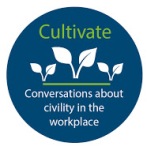Giving positive feedback is an important skill, however it is a tricky skill to apply. We teach giving positive feedback as one of the eight civility practices in our workplace programs .
.
The research from Carol Dweck on growth vs. fixed mindset informs our perspective.
“Mindset change is not about picking up a few pointers here and there. It’s about seeing things in a new way. When people…change to a growth mindset, they change from a judge-and-be-judged framework to a learn-and-help-learn framework. Their commitment is to growth, and growth takes plenty of time, effort, and mutual support.”
Dweck’s work suggests that feedback can impact whether a person stays in a growth mindset or becomes fixed in their thinking about their work. When we acknowledge a person’s talent and intelligence, the person can become stuck or fixed in thinking they need to maintain an image of being talented or smart.
Instead, Dweck recommends that we give feedback that supports process and effort. A good way to do that is to start an ongoing conversation that supports learning and growth. Consider the following interaction between manager and employee…
Manager: I appreciate how well the office has been running since you started.
Employee: Really? Thanks!
This a simple positive feedback interaction. However, we are not sure what mindset we set up for the person receiving positive feedback. It could be possible that the employee is thinking one of two thoughts:
- Wow! I am good. (This can lead to trouble when a manager needs to give constructive feedback. The person might think they are so good that you can’t run the office without them.)
- Oh no! I better not screw up. (This can lead to lack of innovation or a fixed mindset because the person isn’t aware of the process that led to the result. They think it was some talent or luck that they might not be able to apply in new situations. )
Instead of stopping with this two line interaction, follow up with a question that supports the employee to reflect on the effort or process involved in the good result.
Manager: I appreciate how well the office has been running since you started.
Employee: Really? Thanks.
Manager: What are some of the things you did that made the office run better?
Employee: Well, I am not sure. I haven’t really thought about it.
Manager: It would be helpful to know because maybe we can apply the process to other situations.
Employee: Well, I have been paying attention to the workflow. I noticed the reports different people use and thought about how to set things up so everyone knows were to find important reports.
Manager: What other ideas do you have?
Employee: I can’t think of anything right now.
Manager: Ok. This kind of thinking process can be useful in other areas so let’s keep thinking and talking as you have new ideas.
This interaction sets the stage for an on-going dialogue about how things are going. In this manner, conversations plant seeds for a civil workplace that respects the processes that lead to good results.
 The Wallace Centers of Iowa shares tips and tools for leading with civility in the workplace. Tweet your thoughts to keep the conversation going?
The Wallace Centers of Iowa shares tips and tools for leading with civility in the workplace. Tweet your thoughts to keep the conversation going?



